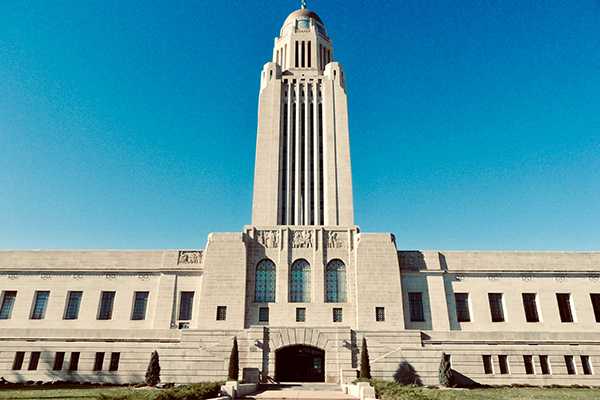
Increasing 34% from 2011 to 2020, Nebraska’s yearly corrections spending is expected to exceed half a billion dollars—including at least $230 million to build a new facility—according to a briefing in September by Crime and Justice Institute (CJI) staff Molly Robustelli and Celeste Gander.
CJI presented its findings to stakeholders in Omaha and online at a conversation organized by RISE, a Nebraska reentry program. The event highlighted lessons from and next steps for the state’s Justice Reinvestment Initiative (JRI), for which CJI provided technical assistance starting in 2021.
Funded by the Department of Justice Office of Justice Programs’ Bureau of Justice Assistance (BJA) and The Pew Charitable Trusts, CJI assisted the Nebraska Criminal Justice Reinvestment Working Group in analyzing corrections data, assessing decision-making throughout the justice system, and developing recommendations for policy and practice changes. Recommendations were translated into a comprehensive legislative reform package, LB 920, which stalled during the short 2022 legislative session. However, elements of LB 920 may be revived in future sessions.
Beyond the staggering costs of corrections spending, CJI’s presentation highlighted other challenges to Nebraska’s justice system, including:
- A growing prison population, up 21% since 2011, and a growing incarceration rate, up 17%—in contrast to a steadily decreasing national rate;
- Acute prison overcrowding, with state correctional facilities at 115% of their operational capacity and six out of 10 prisons exceeding 120% of capacity; and
- Racial disparity in Nebraska’s correctional facilities, with Black people making up 22% of the prison population but just 5% of the general population.
CJI also presented the Working Group’s data-driven policy solutions, projected to save $55 million in averted costs and 1,000 prison beds by 2030, which would:
- Align severity of conduct with severity of punishment;
- Streamline opportunities for release from prison;
- Support alternatives to incarceration;
- Enhance reentry supports for people involved in the justice system;
- Invest in community-based treatment; and
- Support best practices in community supervision.
“Nebraska’s justice system is in crisis, but the Working Group’s comprehensive analysis offered actionable steps forward,” said Robustelli. “State leaders have a critical opportunity to follow the Working Group’s lead and implement data-driven solutions to reduce the state’s prison growth and protect public safety.”
Other speakers included state Senator Steve Lathrop, who sponsored LB 920, state Senator Terrell McKinney, a member of the Task Force and Judiciary Committee, and Jasmine Harris, RISE Director of Public Policy and Advocacy.
“We are in a state of emergency,” said Senator Lathrop. “We continue to waste hundreds of millions of dollars on a broken system despite dismal outcomes. It’s time we prioritize public safety and reduce reoffending by getting smart on crime.”